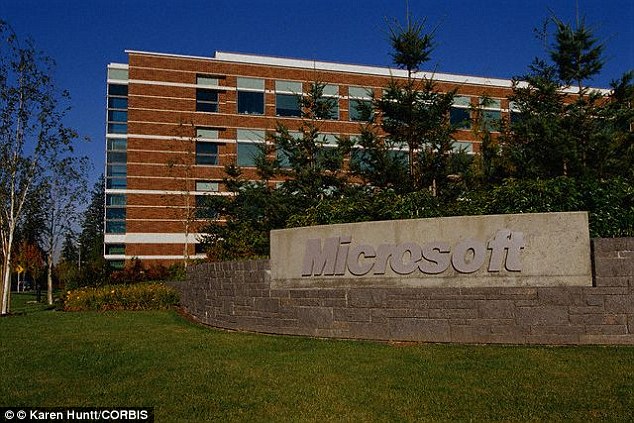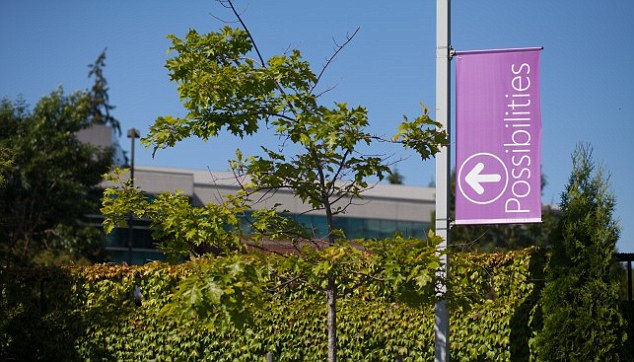AGXStarseed
Well-Known Member
(Not written by me)
Microsoft launches program to hire people with autism: Pilot scheme hoped to boost diversity in the workplace
As part of its commitment to diversity and inclusion, Microsoft has launched a recruitment drive for people with autism.
The pilot scheme will begin by recruiting 10 people with autism or Asperger syndrome to be based at the firm's Redmond offices in Washington.
If successful, the scheme could extend to more vacancies worldwide.

The pilot scheme will recruit 10 people with autism who will be based in Microsoft's Redmond offices in Washington (pictured). Microsoft is running the scheme with support from specialists at Specialisterne. The plans were announced by Mary Ellen Smith, corporate vice president or worldwide operations
Microsoft is running the scheme with support from Specialisterne and the announcement was made on the company's official blog by Mary Ellen Smith, corporate vice president of worldwide operations.
Ms Smith has a 19-year-old autistic son called Shawn.
She wrote: 'At Microsoft, we believe that diversity enriches our performance, our products and services, the communities where we live and work, and the lives of our employees.
'We have been committed to enabling people with disabilities to be successful for a long time [and] this week we announced another exciting effort, a new pilot program with Specialisterne, focused on hiring people with autism for full-time, Redmond-based Microsoft positions.
'It’s early days but we’re excited to get going and we know we’ll learn a lot along the way.'
Specialisterne is based in Denmark and the UK and specialises in recruiting people with autism across varies industries.
Autism is a neurological disorder that affects how a person communicates, and relates to, other people. It can also affect how they make sense of the world around them.
People with autism typically have trouble communicating, looking people in the eye, and can get upset by loud noises or bright lights.
Autism is a spectrum condition, which means that while all people with autism share certain difficulties, their condition affects them in different ways.
Some people with autism, for example, are able to live relatively independent lives but others may have accompanying learning disabilities and need specialist support.
Asperger syndrome is a form of autism and people with the syndrome are often of average or above average intelligence.
They have fewer problems with speech but may still have difficulties with understanding and processing language.
In the UK, charity Papworth Trust is similarly working to improve employment prospects for people with autism, as well as other disablities.
Its Work Programme helps people with disabilities write CVs, prepare for interviews and find suitable roles.
And people can complete work-based training or qualifications at the centre to help them learn new skills, get work experience and find a job.
'Like any employee, each disabled person is a great asset when they're given chance to develop skills,' said the Cambridgeshire charity.

Ms Smith has a 19-year-old autistic son called Shawn. She wrote: 'At Microsoft, we believe that diversity enriches our performance, our products and services, the communities where we live and work, and the lives of our employees. It’s early days but we’re excited to get going and we know we’ll learn a lot along the way.'
Technology industries are said to be suited to people with autism because of how they respond to gadgets and software.
At a young age, for example, experts are finding that simple, carefully constructed apps are enabling affected children to feel safe and communicate more readily because the software is more predictable and ordered than human interaction.
Rhiannan Walton, 32, from West London has been a speech and language therapist for eight years.
She began using technology in her therapy sessions with autistic children approximately 18 months ago.
‘Technology responds in the same way every time; you press a button and it responds how you expect it to,' Walton told MailOnline.
'This particularly appeals to autistic children who can become scared and confused by unpredictability.'
While Vicki Clarke, owner and president of Dynamic Therapy Associates in Georgia added: 'People are messy and computers are neat.
'For our friends with autism, this consistency is easy to understand and comforting.'
SOURCE: Microsoft announces pilot program to hire people with autism | Daily Mail Online
Microsoft launches program to hire people with autism: Pilot scheme hoped to boost diversity in the workplace
- The pilot scheme will initially recruit 10 people with autism
- They will be based in the tech giant's Redmond offices in Washington
- Microsoft is running the scheme with help from specialists Specialisterne
- The plans were announced by Mary Ellen Smith, corporate vice president of worldwide operations, who herself has a 19-year-old autistic son
As part of its commitment to diversity and inclusion, Microsoft has launched a recruitment drive for people with autism.
The pilot scheme will begin by recruiting 10 people with autism or Asperger syndrome to be based at the firm's Redmond offices in Washington.
If successful, the scheme could extend to more vacancies worldwide.

The pilot scheme will recruit 10 people with autism who will be based in Microsoft's Redmond offices in Washington (pictured). Microsoft is running the scheme with support from specialists at Specialisterne. The plans were announced by Mary Ellen Smith, corporate vice president or worldwide operations
Microsoft is running the scheme with support from Specialisterne and the announcement was made on the company's official blog by Mary Ellen Smith, corporate vice president of worldwide operations.
Ms Smith has a 19-year-old autistic son called Shawn.
She wrote: 'At Microsoft, we believe that diversity enriches our performance, our products and services, the communities where we live and work, and the lives of our employees.
'We have been committed to enabling people with disabilities to be successful for a long time [and] this week we announced another exciting effort, a new pilot program with Specialisterne, focused on hiring people with autism for full-time, Redmond-based Microsoft positions.
'It’s early days but we’re excited to get going and we know we’ll learn a lot along the way.'
Specialisterne is based in Denmark and the UK and specialises in recruiting people with autism across varies industries.
Autism is a neurological disorder that affects how a person communicates, and relates to, other people. It can also affect how they make sense of the world around them.
People with autism typically have trouble communicating, looking people in the eye, and can get upset by loud noises or bright lights.
Autism is a spectrum condition, which means that while all people with autism share certain difficulties, their condition affects them in different ways.
Some people with autism, for example, are able to live relatively independent lives but others may have accompanying learning disabilities and need specialist support.
Asperger syndrome is a form of autism and people with the syndrome are often of average or above average intelligence.
They have fewer problems with speech but may still have difficulties with understanding and processing language.
In the UK, charity Papworth Trust is similarly working to improve employment prospects for people with autism, as well as other disablities.
Its Work Programme helps people with disabilities write CVs, prepare for interviews and find suitable roles.
And people can complete work-based training or qualifications at the centre to help them learn new skills, get work experience and find a job.
'Like any employee, each disabled person is a great asset when they're given chance to develop skills,' said the Cambridgeshire charity.

Ms Smith has a 19-year-old autistic son called Shawn. She wrote: 'At Microsoft, we believe that diversity enriches our performance, our products and services, the communities where we live and work, and the lives of our employees. It’s early days but we’re excited to get going and we know we’ll learn a lot along the way.'
Technology industries are said to be suited to people with autism because of how they respond to gadgets and software.
At a young age, for example, experts are finding that simple, carefully constructed apps are enabling affected children to feel safe and communicate more readily because the software is more predictable and ordered than human interaction.
Rhiannan Walton, 32, from West London has been a speech and language therapist for eight years.
She began using technology in her therapy sessions with autistic children approximately 18 months ago.
‘Technology responds in the same way every time; you press a button and it responds how you expect it to,' Walton told MailOnline.
'This particularly appeals to autistic children who can become scared and confused by unpredictability.'
While Vicki Clarke, owner and president of Dynamic Therapy Associates in Georgia added: 'People are messy and computers are neat.
'For our friends with autism, this consistency is easy to understand and comforting.'
SOURCE: Microsoft announces pilot program to hire people with autism | Daily Mail Online